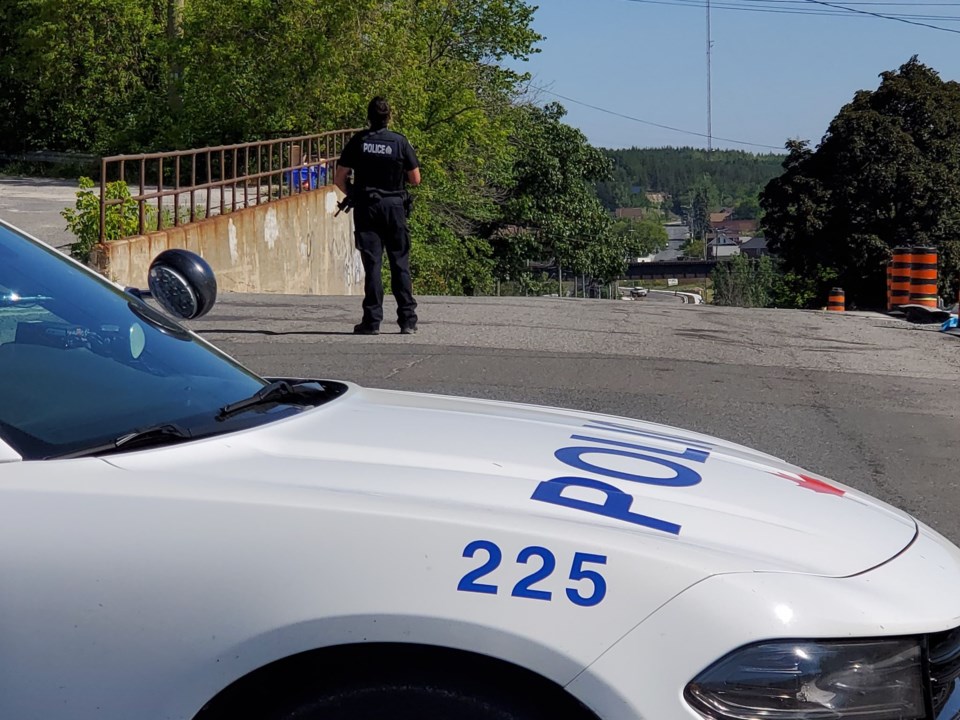Starting June 14, when police officers are called out to a mental health-related crisis, they will be accompanied by a mental health professional in an effort to “help people in the right place at the right time,” said the program’s lead.
Russell Landry said across Ontario, police services are seeing an increase in calls for mental health crises.
Landry is the Northeastern Ontario lead for Mobile Crisis Rapid Response Teams (MCRRT). In Sudbury, the MCRRT has been developed in collaboration with Health Sciences North, Greater Sudbury Police Service and the Ontario Provincial Police.
A MCRRT provides on-site assessments conducted by mental health and addictions professionals providing referrals and recommendations to community services, allowing for appropriate diversion from the emergency department.
Greater Sudbury Police responded to three calls for a person in distress on the Bridge of Nations between March 13 and April 29 alone.
On March 19, a 53-year-old woman fell from the Bridge of Nations and died as a result.
Days later, on March 21, police were called to the Bridge of Nations once again in response to a man who was threatening to jump off. However, the situation was successfully de-escalated and the 26-year-old man was transported to hospital to receive the support services that he requires.
Then on April 29, officers once again successfully de-escalated another individual who was threatening to jump.
In November, Sudbury.com published an editorial on the topic, highlighting the fact that police services in Canada are increasingly being used as frontline mental health professionals, a job for which they are neither hired nor trained, and this too often leads to the death of a person in crisis.
“In 2020, GSPS Officers responded to 530 mental health-related calls for service that resulted in 264 apprehensions under the Mental Health Act and 489 hours spent in the Emergency Department," said Insp. Sara Cunningham, GSPS Strategic Operations. "This suggests that a significant number of calls did not necessarily require police intervention."
It’s situations like these where the MCRRT will come in. The goal is to streamline access to mental health in crisis support in an emergency situation and to reduce the number of unnecessary referrals to the emergency department. Instead, those who have been in a mental health crisis will be directed to services they need to ensure their well-being is taken care of, said Landry.
It’s not that police officers aren’t being trained for these situations, but the clinicians have the expertise to deal with the issues that are presenting for the person who is in crisis, Landry said.
“There are many skilled officers in Greater Sudbury Police and the Ontario Provincial Police who have a great rapport with the patients and are trained to help them, but the clinician is there to really offer that expertise.”
Greater Sudbury will be the latest community in Northeastern Ontario to launch a MCRRT. There are already seven teams established throughout the region.
“We are seeing a lot of success with the other MCRRTs across Northeastern Ontario, such as North Bay, Timmins and Sault Ste. Marie,” said Landry.
The 911 emergency communication centre will triage mental health-related calls. If a call cannot be triaged, the MCRRT will be dispatched. The MCRRT is available 24 hours a day, seven days a week
Last year, there were 2,189 calls for mental health crises across Northeastern Ontario, said Landry, and 1,423 of those calls were diverted from the emergency department because of the MCRRTs.
“We think that is pretty successful,” Landry said. “I am very excited to be launching this on Monday. We have put a lot of sweat equity into this, and to build partnerships across three organizations was an absolute win for everyone.”
This fall, MCRRT officers from both GSPS and OPP will complete additional de-escalation and empathy-based training.
